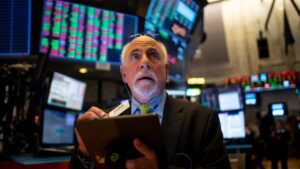Brace yourselves.
The U.S. stock market could become a “minefield” this upcoming earnings season as companies begin to feel the heat from slowing economies around the globe, warns Peter Boockvar, chief investment officer at Bleakley Financial Group.
“Earnings, I think, are going to be that minefield,” he said Thursday on CNBC’s “Futures Now.” “You’re going to have some companies that deliver and they’re going to get rewarded, but if you’re a big multinational company that has exposure in Asia and Europe and Latin America and certainly in the U.S., it’s going to be hard to manage this.”
In short, companies “better come through” despite slowing revenue growth and receding profit margins if they hope to withstand the widespread pain, the market watcher said.
And, so far, it’s not looking good. Although earnings season unofficially begins when the big banks start to report their results on Oct. 15, recent reports from cruise line company Carnival and delivery giant FedEx have come up as red flags, Boockvar said.
“While [Carnival executives] did cite a stronger dollar [and] higher oil prices” as reasons for the pain, “they also talked about softness in Europe and Asia,” Boockvar said. “We saw FedEx a couple weeks ago, and while some of FedEx’s issues are company-specific, I think it’s a great bellwether for its … supply chains around the world, and what they say about the macro environment I think is very important.”
Unfortunately, Boockvar — who recommended gold, silver and value stocks to investors looking to stay afloat — didn’t see much reprieve ahead for even domestic companies.
“They’re not going to be immune. If you’re a restaurant company that’s focused in the U.S. but you have restaurants that are near manufacturing facilities or transportation facilities, you’re going to still feel the impact,” he said. “While maybe they do better than some of the multinationals because U.S. growth is better than what we’re seeing overseas, they’re certainly not immune, and I do think they’re now beginning to get impacted.”
Worse yet, what many investors see as a “Fed put” — the ability of the Fed to cushion markets with monetary policy should they see a sustained decline — isn’t as certain as they may think, Boockvar said.
“I think the reason why the S&P is around 3,000 is because people still think that it’s somehow embedded in the market,” he said. “But … understand that when you are in an already very low-rate environment, further easing by your central bank is not going to stimulate any more growth, as we’re seeing in Japan and Europe. … I just happen to think that people are going to wake up one day and realize that that put is not effective anymore.”
The one piece of decent news? Boockvar doesn’t see investors’ shift from growth stocks to value names ending anytime soon.
“This growth-to-value shift is not just a one- or two-week thing,” he said. “I do think that this is a change in the market’s attitude towards high valuations, and it really has started in the IPO market. It started with Lyft and then with Uber and then with WeWork and maybe today with Peloton, that there is a valuation rethink, therefore value stocks … that have already embedded very low expectations I think will outperform.”
Stocks fell Friday after a source told CNBC that the Trump administration was considering pulling some or all U.S. investments out of China.
Disclaimer

